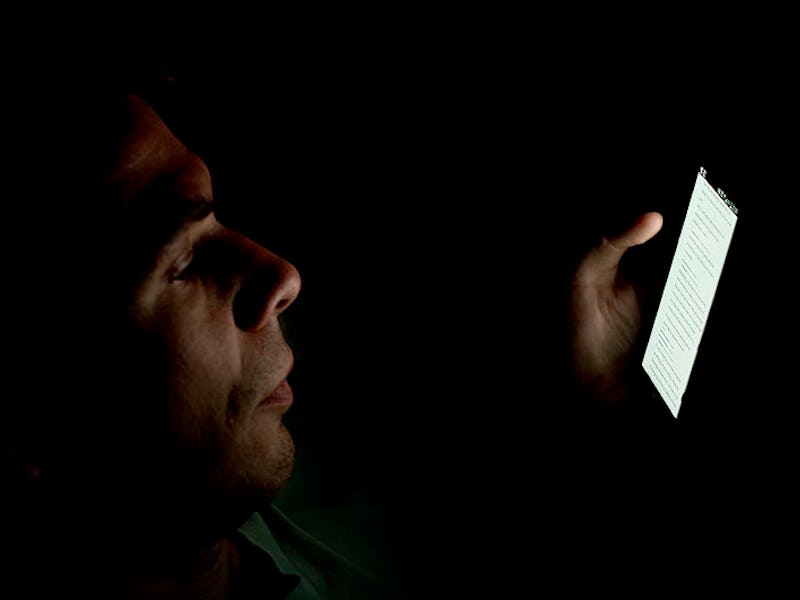Harmful Effects of Screens on Sleep Are "Easily Reversed" in New Experiment
With the right tool and some fortitude, good sleep is within our reach.

Tucking a phone or tablet away in another room before bed is a common sleep hygiene rule of thumb. But in reality, completely abandoning the phone before bed forever is a big task. Fortunately, the results of a new experiment presented on Sunday show that the harmful effects of blue light on sleep can be “easily reversed” — after a short(ish) detox period.
Though constant screen use is a relatively recent phenomenon, it’s becoming clear that exposure does have some impact on sleep even if it’s not the only aspect of modern life keeping us up at night. Electronic exposure in the evening “potentially disrupts sleep,” in part due to the blue light that is emitted from LED-based screens like tablets, phones, and computers, according to the American Academy of Pediatrics. One reason that happens is that blue light can suppress the release of melatonin, the hormone that regulates the sleep-wake cycle.
The new study, run by University of Amsterdam post-doctoral researcher Dirk Jan Stenvers, Ph.D., in conjunction with the Dutch National Institute for Public Health and the Environment, showed that blue light really did impact the sleep of 25 teens who were “frequent” screen users. But fortunately, Stenvers found that the effects can be reversed — with the right tools and some fortitude.
“Adolescents increasingly spend more time on devices with screens, and sleep complaints are frequent in this age group,” Stenvers said as he presented his abstract at the European Society of Endocrinology meeting in Lyon, France, on Sunday. “Here we show very simply that these sleep complaints can be easily reversed by minimizing evening screen use or exposure to blue fivelight.”
Stenvers trial lasted five weeks, during which he conducted an experiment on 55 Dutch teens: 25 “frequent screen users,” who used devices for four or more hours per day, and 30 non-frequent users, who, impressively, only used screens for about an hour per day. During that period, each group of teens (who lived at home, not in a lab) put away their screens in the evenings for the whole week, and then, after a week off, got a chance to use some Guy Fieri-style orange-tinted blue light goggles to block out harmful rays.
On average, the frequent screen users took 30 minutes longer to fall asleep and also reported more disturbances during the night. But after six nights of either abstaining from screen use or wearing orange-tinted glasses, their sleep patterns started to look at lot more like those of the non-frequent screen users.
In short, their detox from blue light seemed to work.
The blue light from tablet, laptop, and phone screens can disrupt circadian rhythm and make it harder to sleep.
When the frequent users either wore the glasses or abstained from screens, they fell asleep 20 minutes faster and woke up 20 minutes later on average. “Both interventions restored sleep times of frequent users to around those of infrequent users,” the authors note in their abstract.
The efficacy of these solutions, they add, may come down to melatonin — the sleep-related hormone that spikes around bedtime but is suppressed by blue light exposure. In the absence of evening screen abstinence, it sees that the orange-tinted glasses may help halt the light’s melatonin-suppressing effects. This finding echoes previous trials on blue light filters and is part of the idea behind Apple’s Night Shift mode.
Though Stenvers says that the sleep loss was “easily reversed” by these simple interventions, abstaining from a screen entirely for a week requires a unique type of mental fortitude. In reality, it’s probably not possible for people who work computer jobs or watch Game of Thrones at 9 p.m. every Sunday and drift off to sleep with a fresh dose of new possible endings running through their minds.
But if you can stand to watch King’s Landing burn through the orange tint of a blue light blocker, your sleep could be far more peaceful — even if you can’t quite manage to pry yourself away from the screen.
Partial Abstract:
Methods: We identified frequent screen users (use ? 4 hr per day, n =25) and infrequent screen users (use ? 1 hr per day, n = 30) among Dutch adolescents aged 12-17 yr. In a 5-week randomized controlled crossover trial, the frequent screen users were assessed for 3 evening interventions of 1 week each, with 1-week washout periods: 1) during habitual screen use; 2) while wearing blue-light-blocking glasses; 3) while completely refraining from screen use. In a case-control sub-study, infrequent screen users were assessed for 1 week. In every measurement week, sleep was assessed using sleep diaries and actigraphy, and melatonin onset was assessed using at home 30-minute saliva sampling on the final evening of each intervention week. The trials were registered as NTR6712 (RCT) and NTR6722 (case-control).
Results: In frequent screen users, blue-light-blocking glasses as well as refraining from screen use induced an earlier mid-point of sleep compared to habitual screen use. Both interventions restored sleep times of frequent users to around those of infrequent users. In many subjects it was difficult to identify a clear-cut melatonin onset, but blue-light-blocking glasses reduced absolute melatonin levels compared to habitual screen use.